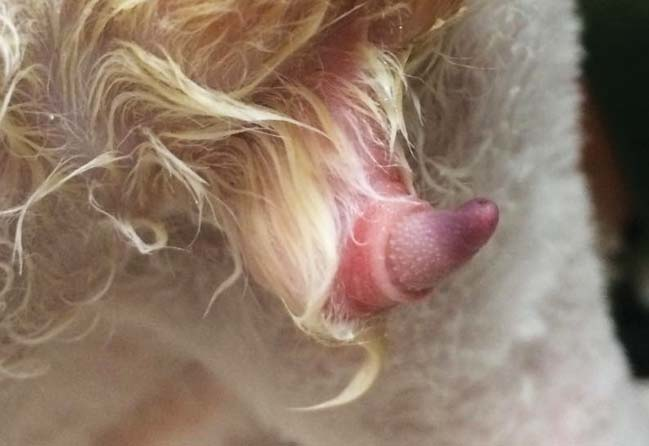Neutering is a surgical procedure performed by a veterinarian to remove a cat’s reproductive organs. The idea is to control unnecessary reproduction.
Neutering is generally recommended for cats that are not part of a breeding program, as it can help to reduce the population of unwanted animals.
In addition, neutering can help to reduce aggression and roaming behavior in male cats.
It can also help to reduce the risk of developing certain health problems, such as testicular cancer.
The decision to neuter should be made on an individual basis, taking into account the age, health, and temperament of the cat.
There are risks and benefits associated with neutering, so it is important to discuss all options with your veterinarian before making a decision.
Once your cat has been neutered, you can rest easy knowing that they cannot reproduce.
But what exactly does this mean? Keep reading to find out all there is to know about neutering your cat.
Can A Neutered Cat Get Erect?

The answer may surprise you, but the answer is yes!
Just because a cat has been neutered doesn’t mean that he can’t still get aroused.
However, it’s important to note that neutering will not change a cat’s sexual behavior or make them less interested in sex.
In fact, some studies have shown that neutered cats are actually more likely to engage in sexual activity than intact (not neutered) cats.
The reason for this is unclear, but it may be because neutered cats have more testosterone in their system, which can increase libido.
Do Neutered Cats Still Have The Urge To Mate?
Yes, neutered cats still have the urge to mate, but they cannot physically produce sperm.
Studies have shown that the urge to mate will not go away immediately after a cat is neutered.
In some cats, this urge will remain with them for a lifetime although, in most cats, the urge will eventually ebb away with time.
This is why it’s important to continue to provide your neutered cat with access to appropriate outlets for their sexual drive, such as regular play sessions with interactive toys or other cats in the home.
If you have any concerns that your neutered cat’s sexual drive is causing them distress, please consult with your veterinarian.
While neutering will not eliminate a cat’s sex drive, it will typically reduce it and may help to alleviate some of the associated behavioral problems, such as spraying and excessive vocalization.
Why Is My Neutered Cat Trying To Hump?

If you’ve ever seen your neutered cat trying to hump a pillow or another cat, you may be wondering what’s going on.
While this behavior may seem strange, it’s actually pretty common.
There are a few different reasons why neutered cats may try to hump.
One possibility is that they’re trying to assert their dominance over other animals in the home.
Neutered cats may also hump because it feels good, or because they’re bored and looking for something to do.
In most cases, this behavior is harmless and doesn’t mean that your cat is sexually frustrated.
However, if your cat is becoming too aggressive with his humping, you may need to talk to your veterinarian about how to best discourage this behavior.
Do Neutered Cats Go Into Heat?
It makes sense to wonder whether your neutered cat can still go into heat.
The answer is No: neutered cats cannot go into heat.
However, they can still experience erections. This is because the hormones that cause sexual arousal are still present in their bodies, even though they have been castrated.
The level of these hormones is much lower than it would be if the cat were intact (not neutered), but they are still enough to induce an erection.
So, although neutered cats cannot mate or reproduce, they can still get “aroused.”
Related Post: How Long Does a Male Cat Stay in Heat?
Do Neutered Male Cats Still Respond To Females In Heat?

Although neutering a male cat will typically reduce his interest in females, there are still some cases where he may respond to a female in heat. He may follow her around, call out to her, and try to mount her.
While this behavior can be annoying for the female, it is important to remember that the male cat cannot actually mate.
In some cases, it may be necessary to keep the male and female cats separated if he is proving to be too much of a nuisance.
However, in most cases, the behavior will eventually subside as the male cat becomes less interested in the female.
Can A Neutered Cat Still Produce Sperm?
While it is true that neutering a male cat will prevent him from reproducing, it is not the same as castration.
In fact, a neutered cat can still produce sperm, though he will be unable to father kittens.
The procedure for neutering a cat involves the removal of the testicles, which produce both testosterone and sperm.
However, some sperm may remain in the epididymis, a small duct located just behind the testicles.
This sperm is not capable of fertilizing eggs, but it can still be released during ejaculation.
For this reason, most veterinarians recommend that male cats be neutered before they reach sexual maturity.
Once the testicles have been removed, the cat will no longer produce sperm or hormones.
Can A Neutered Cat Still Get A Female Pregnant?

Although it may seem unlikely, a neutered male cat can still get a female cat pregnant.
This is because the surgery to remove the testicles does not always prevent the production of sperm.
In fact, sperm can still be produced for up to six weeks after surgery.
However, the chances of a neutered cat impregnating a female are very low. This is because the hormone that promotes sperm production is also responsible for the development of the testicles.
Without this hormone, the sperm cells are typically smaller and fewer in number. As a result, they are less likely to successfully fertilize an egg.
Nevertheless, it is always best to err on the side of caution and keep your neutered cat away from unspayed females.
This is why the American Society for the Prevention of Cruelty to Animals recommends that you should separate your male neutered cat from female cats for a couple of weeks.
How Long Does A Male Cat Stay Fertile After Being Neutered?
Male cats can remain fertile for several weeks (up to six weeks) after they are neutered.
However, the length of time varies depending on the individual cat. Some cats may be infertile immediately after surgery, while others may retain their fertility for several months.
In general, it is best to assume that a male cat is still fertile until he has been checked by a veterinarian and given a clean bill of health.
If you are concerned about your cat’s fertility, schedule an appointment with your vet as soon as possible.
Does The Mating Season Affect Neutered Cats?
For the most part, a neutered cat will not be a victim of “mating season” behaviors.
That said, it largely depends on when the cat was neutered. If he was fixed when he had already reached puberty, then he may still display some of the mating season behaviors like territorial aggression, wandering, and spraying.
This behavior can be worse in cats that had mated at least once before they were neutered.
There is no telling when the mating behaviors will disappear once the cat has been neutered.
Vets say that in some cats, the behaviors get suppressed and disappear within days, others weeks or months while others can take years.
The surefire way to ensure the best results is to get your cat neutered before he gets sexually mature.
Conclusion
As we have seen, neutering your cat will not make him stop erecting immediately.
So, if you see your tomcat displaying mating season characteristics, there is nothing to worry about.
Granted, these urges will eventually go away and your male cat will ultimately lose interest in humping females and other objects.
Depending on a couple of things, this could take weeks, months, or even years.
You could hasten the process by neutering your cat before he gets into puberty.
If your cat continues to be too aggressive e.g. the humping seems to be out of control, then you may want to talk to your vet about it as there could be something wrong. Otherwise, the occasional hump shouldn’t worry you.
Related Posts:
Why Is My Male Cat Sleeping A Lot After Neutering?
Male Cat Behavior after Neutering: Here’s What to Expect

Hi! I am Eleanor Price. I started this website after my cat, Louie, almost died from a case of botulism (a type of food poisoning often caused by bacteria that grow on food items). Turned out that my cat’s diet was the problem. I have made it my duty to provide the best information and recommendations about everything cat lovers need to know about their felines’ health and wellbeing. My goal is to find the most informative content on anything feline-related and share it with fellow hardworking kitty lovers.

